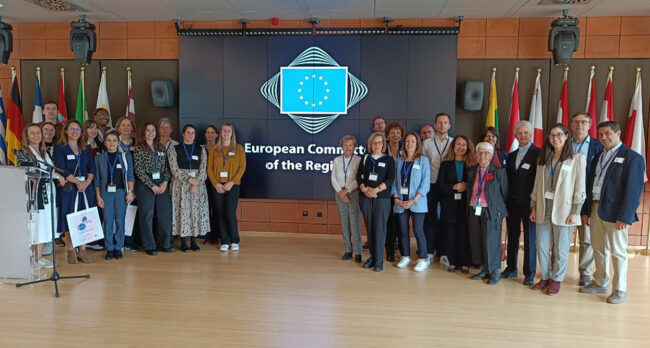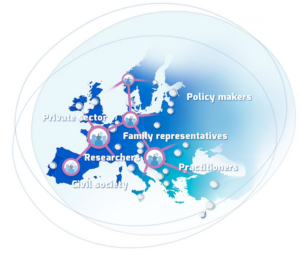Child and Family Support in Europe : ensuring families receive the best possible care
05.12.24

We were delighted to coorganise, together with the European Parents Association (EPA), the “Quality Assurance in Child and Family Support in Europe: Policy Lessons for Evidence-Informed Decision Making” initiated by the European Family Support Network EurofamNet. The network which comprises 35 Countries, 173 Participants, 144 full members, 29 Associated members and 13 European organizations, presented its work in developing and implementing a quality assurance protocol in child and family support that is expected to produce an evidence-based and culturally-informed novel model for integrated care.
The Quality Assurance Protocol, created through collaborative efforts between researchers, practitioners, and policymakers was presented by professors Lucia Jimenez, Maria Josefa Rodrigo, John Canavan and David Herrera. The protocol aims to improve child and family well-being, based on the premise that both parents and children have the right to quality family support. Since children and families are rights holders, their interests and well-being should be at the heart of social policies as these are interlinked. The protocol ensures that families receive the best possible care, regardless of where they live or what challenges they face.
The network seeks to advance this by informing policy and practice through an evidence-based and culturally sensitive approach, ensuring that the support provided to families is effective, aligned with their needs, and of high quality. Furthermore evidence-based policies are essential for policymaking, as they lead to better outcomes for children and families and should be a political priority. And quality assurance systems based on evidence are not only cost-effective but also sustainable in the long term. The EurofamNet speakers highlighted key elements such as the importance of early intervention, recognition of family diversity, and a focus on vulnerable groups.
Senior policy makers at the European level participated in the event, reflecting on the implications for the implementation and sustainability of high-quality child and family support provision in Europe.
From the EU Parliament, MEP Maria Walsh delivered a very strong message on the importance of the work of the network..
From the European Commission, DG Employment, represented by Stefan Iszkowski presented the “European Child Guarantee” as an example of evidence-based policymaking. He explained how this initiative aims at breaking the cycle of disadvantage by investing in children living in poverty and social exclusion, and at bringing about a long-term impact on the lives of these children. Within this initiative, the European Commission has asked Member States to ensure access to and dedicate funding for quality early childhood education and care, education, healthcare, decent housing, and nutrition. The EU Commission has also urged member states to produce regular progress reports to monitor the success of the Child Guarantee in combating child and family poverty.
The DG Justice of the European Commission, represented by Chrisoula Arcoudis presented the new EU Commission Recommendation on “Integrated Child Protection Systems” stressing the need to replace siloed approaches with integrated child protection systems, focusing on strengthening national child protection frameworks. This Recommendation recognises families as primary carers and calls on the Member States to:
- promote an interdisciplinary approach involving parents;
- provide parenting support and family support by providing the necessary conditions to prevent family separatation, in the best interest of the child;
- and to take all measures to ensure the prioritisation of familiy-based and community-care for children when placing children into alternative care.
This Recommendation also includes the need for developing national plans to combat violence against children, addresse domestic violence, promote family reunification, and eventually child deinstitutionalisation. The EU Commission emphasised the central role of parents in providing care and the need to support them in this role as a core component of this recomendation.
The European Parents Association (EPA) presented EU statistics showing, among others, that adults with children in the EU make every effort to meet their families’ needs, but in many cases, they lack governmental support and fall through the cracks. For example, among non-working adults, 7.1% have children, compared to 17.4% who do not have children. The association also called for greater family support to assist parents in the challenging task of raising children.
 As a Policy and Practice Group lead of Eurofamnet, we underlined the fact that “family support” has to be understood not just as providing financial aid or access to services; but about empowering families to nurture, protect, and enable their members, including children, to thrive. Family support should aim to promote not only the well-being of the child but also of the parents and the family unit as a whole. By developing such a framework, we create accountability, enhance service delivery, and, most importantly, uphold the rights and well-being of children and families.
As a Policy and Practice Group lead of Eurofamnet, we underlined the fact that “family support” has to be understood not just as providing financial aid or access to services; but about empowering families to nurture, protect, and enable their members, including children, to thrive. Family support should aim to promote not only the well-being of the child but also of the parents and the family unit as a whole. By developing such a framework, we create accountability, enhance service delivery, and, most importantly, uphold the rights and well-being of children and families.
We stressed the importance of family advocacy and practice in shaping policy and the need to strengthen the “magic triangle of collaboration between politicians, researchers and practitioners” and continue to advocate for quality family support as the only effective way to support parents and children in Europe.
The New EU Gender Equality Roadmap : A Call for Inclusion of Mothers
04.03.25
The European Commission’s initiative on a new Gender Equality Roadmap post-2025, marks a significant step forward in addressing gender disparities across the European Union. Make Mothers Matter (MMM
Breaking the Cycle: Gender Equality as a Path to Better Mental Health
18.03.25
The Council of the European Union has taken a decisive step in recognising the vital connection between gender equality and mental health.
Europe Must Listen to Mothers: Our landmark report heads to the European Parliament
28.08.25
On 22 September 2025, the voices of mothers will take centre stage in Brussels. For the first time, Make Mothers Matter (MMM) will present its State of Motherhood in Europe








